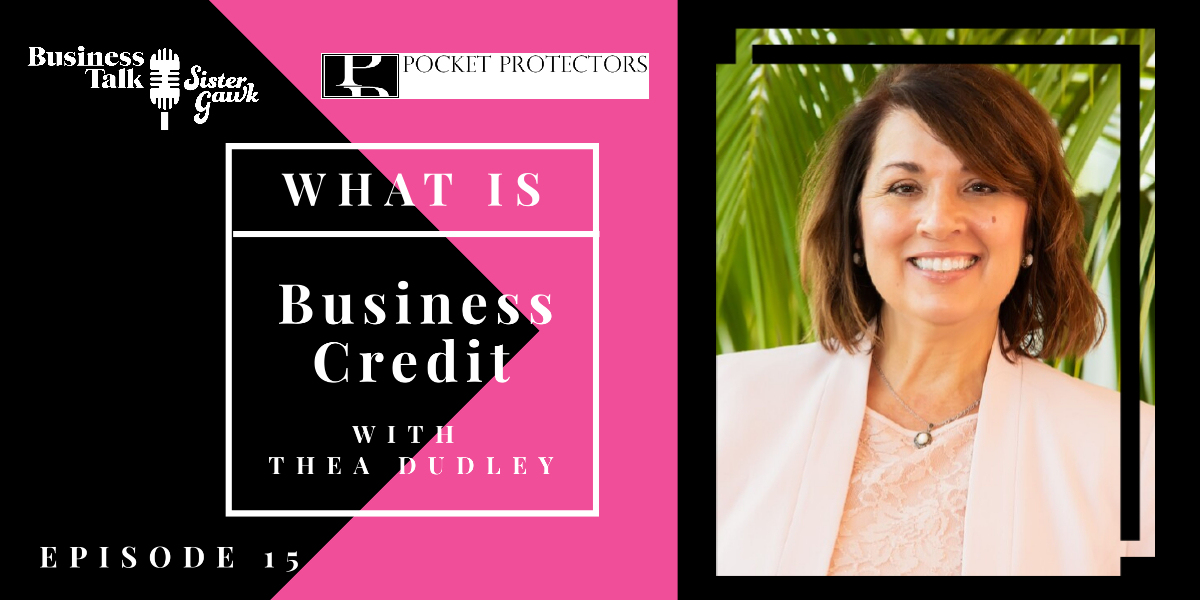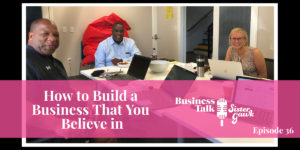We are super excited to talk with you guys about our guest Thea Dudley. This woman is someone who has been an incredible impact on my life and in starting a business. She is such an encouragement to so many people who may have very strong leadership personalities as females. This lady has such wisdom. She is going to talk to us today a little bit about the business of credit. Thea, thank you so much for being here today!
Thea: Thank you for having me!
Bekkah: We are so excited. Can you please tell us what you do for a business?
Thea: I have a company called Pocket Protectors. I go into companies, usually, it’s in the construction industry whether it’s distributors, contractors, or manufacturers and I help them with their back-office processes. Those encompass credit collections, granting credit, collecting the money, having those customer successful relationships, and how the billing process and all of those back-office items flow into that. It really ties into your cash flow. If you don’t have the cash flow you’re not going to have a business very long. I think it’s the best most important part of the business to be in. Not everybody thinks credit is awesome but they’re wrong.
Ruthie: At some point or another stumbled upon credit being awesome. How did you get started with that? What was your “why” for that?
Thea: By accident. Nobody wakes up one day and says, “I want to be a credit manager. That sounds like a rockstar move. Usually, it happens by default. Somebody gets you to do a couple of collection calls or you’re working with a customer through a billing issue or something of that nature. It’s like a tar pit. You keep getting sucked in deeper and deeper until pretty soon you’re running the place.
Bekkah: Business credit is specifically when businesses to businesses offer them financing? How does that work?
What is Trade Credit In Working With Businesses?
Thea: That is true. It’s known as trade credit. Let’s say I am a roofing distributor and I’m selling roofing products. I have roofing contractors that come to me. They fill out a credit application and say that they need five hundred thousand dollars line of credit per month. Or they fifty thousand or five thousand, whatever the amount of that they’re looking for is. The company basically does a short-term loan in the form of product. You decide who gets credit and who doesn’t. How they pay you and what that whole relationship looks. Sales can work really hard to get customers in the door but your credit department can absolutely lose them for you if you don’t have it staffed with people that can tap into a little bit of their inner salesperson and help keep that money flowing.
Ruthie: So you stumbled upon it and then you started your own business? How did you do that?
Thea: Well that made it sound like that happened overnight. It didn’t. But thank you! That was awesome! It took a little bit over thirty years for me to go out on my own. I started in the industry in the late 80s. Construction or lumber that type of environment was not very female-friendly. It was a very male-dominated industry. The building material and construction industry. You rarely saw any women in a leadership role. The ones that were in a leadership role I didn’t have access to because I was too far down the ladder. A lot of them just didn’t have the time to give you. So I worked my way up through the corporate ladder and I stuck with it. I kept taking over more departments. I got my first vice presidency about six or seven years ago. Then moved to another company that was quite a bit larger and took over vice presidency there. Then decided at this point in my career, I’m not doing exactly what I love and I want to focus on where I get the most joy and where I really feel like I can make a difference. That’s working with the companies individually on their back-office and getting their people trained. So that was my career synapses! My thirty years in five seconds or less.
Bekkah: You were so succinct! I’m very impressed by that actually. Tell us a little bit about that journey because I know before when we had talked, you mentioned that you wanted to be a journalist. Now you’re writing for LBM Journal in the construction industry. But that was so long in the making. It came full circle. It’s part of what you do but not everything.
Thea: Originally when I was graduating high school I got a scholarship to Brigham Young University and it was for journalism. I really wanted to go into journalism. Unfortunately, my family had some issues and I had to make some choices. I chose to stay at home and help my family. I gave up going to college. I gave up the scholarship and I kind of gave up the dream at that point. Fast forward 25 years, it ends up that somebody saw me speak. It turns out he was the editor of pro sales magazine. He asked if he could do an article on me because credit people rarely get front and center and rarely do a lot of educational pieces at larger events that are not credit-related. The company that I worked for said, “No, we don’t want you to do the interview. We’re a privately held company. We don’t want to do it.” So I pushed and pushed. I didn’t take no for. I kept taking a run at it and finally, they agreed to let me do the interview. They got right down to just prior to the article being published and the company I worked for pulled the plug on it.
Their whole reason was, “If you get popular and somebody sees this in a magazine then they’ll hire you.” Which was crazy logic because that’s just so ridiculous. If you’re happy where you are that’s not going to be your reason to leave. There has to be something motivating you. I swallowed that bitter pill. It hurt. I was frustrated. I was angry at my company but stuck with it and kept taking another run at it. They eventually published an article that I wrote. Then I suggested doing a credit advice column. They agreed and I wrote with them for about four years before moving the column over to LBM Journal. It has been there for the last year. It was a long time fulfilling a dream that I had. Which I used as an example to different people that I work with. You can have everything you want, you just might not have it all at once and it might not be in the timeframe that you think.
What Is It Like to Work In the Credit Industry?
Bekkah: What did that credit journey look like for working in it from the beginning? Was it hard to do at first talking to people about their finances? Did your personality play into it at all or can anyone do that? How did that work?
Thea: I think anybody’s capable of doing it. Part of it is do you want to? You have to like people. You have to want to have those conversations. People will tell you anything about themselves. Anything! And I mean people would tell me about their sex lives before they would tell me about their finances. I don’t want to know you like that please stop talking. I just want to know when you’re going to pay me. I don’t care what’s going on. It’s not that you want to be unkind, it’s just wow this is so much not what I wanted to hear. You have to be able to roll with things. You have to let stuff roll off of you. If you take everything somebody says to you personally you’re not going to make it in credit. People under pressure say really stupid things and usually hurtful things. I had one guy years ago, going back quite a ways where everyone still had landlines and you had caller ID.
Of course, I was calling the guy to get his bill paid and he wouldn’t answer the phone. He wouldn’t do anything. All of a sudden I started getting calls at home and it was this guy! The guy who owned this company and he said, “How do you like being called for money!?” I’m like, “Well, honey, I don’t owe you any money so I’m not sure what exactly you’re trying to do here.” I had to change my phone number after that and make sure it was unpublished. The point is people do all kinds of crazy things when they’re under pressure. You just have to contextualize it and not be so caught up in what they say or do that you forget what your goal is. It’s like look, I can put up with a lot of stuff but when you’re done being bent out of shape, can we talk about how we’re going to get your credit straightened out? Because you’re not going to get any more product or services out the door if you can’t do that.
Ruthie: Sounds like you have very thick skin and have had to weather a lot of harsh words.
Thea: Oh the stuff I’ve had said to me over the years. Include that with being a woman in that industry, I got a lot of, “Let me tell you, sweetheart, I don’t think you understand our business. I don’t think you understand construction.” Okay, let’s play your game. Let’s say I don’t understand anything about construction, which my dad was a contractor so there’s not really a lot of validity there. But let’s pretend I don’t know anything. Here’s what I do know: you’re past due. You’re broke little heinie is not going to get one more bit of materials out the door unless you can come to the table with something. By the way, insulting me or ticking me off is not going to help you.
Bekkah: That sounds like something my mom would say to me.
Thea: My kids did not really appreciate my job growing up because I took a lot of FBI interrogation and interview classes. I was always trying to find a way to get better at my job. Aside from just the technical side of knowing credit. Things like here’s how to read a credit, report here’s how to do all those things, aside from all of that, you really want to build up what I refer to as soft skills. You really want to be able to communicate with people. You want to be able to tap into maybe some negotiating skills. Have a sense of humor about it. Know how to work somebody’s personality to where it fits with yours and you create a connection. I spent four days in Asheville with the FBI interrogation and interview classes. They were really cool. It was me, one building materials person, the Asheville Police Department, a couple of FBI guys, a couple of bank fraud, and a couple of US Marshals. During one of the breaks one of them said to me, “You know, I get why everyone else is here. I really don’t get you.”
Ruthie: What did you tell him?
Thea: I said, “Well you know, what we do isn’t that far apart. I’m trying to figure out how to extract information from people who don’t always want to give it so that I can figure out how to get them to work with me. I really don’t want to sue people. I really don’t want to cut them off. I know that my company needs to sell products or services to be able to keep cash flow going. We are a for-profit corporation so I’m just trying to figure out what angle can I use? What’s another tool in my toolkit that I can come up with? We ended up having a lot of fun. I started trying to use all these techniques on my kids and they were both like, “Oh my god. I hate your job.”
Ruthie: Oh man! What have you done and I assume are still doing, given your personality in the way that you seem to be such a constant learner? What advice would you give to people as they are maybe looking to pursue something like this? What things can they be doing? You talked about the FBI classes but what else have you done to kind of prepare yourself for success?
What Can A Person Do to Prepare Themselves to Work in The Business Credit Industry?
Thea: I took handwriting analysis. I took basic communication. I took a lot of sales training classes. I found those fascinating. The same tools that salesmen use to connect with a customer are the same tools that credit people can use. Basically, you are creating a relationship. If somebody’s comfortable with you, they’ll talk to you. I’ve had people when I said, “Hey I need to see your financial statement for your business.” They’ll come back and say, “Well, we don’t share those with anyone.” You’re asking for half a million dollars so you’re going to have to show me a little something. I think it’s fair. I’m not going to tell anybody what’s on there. I need you to trust me. I’m willing to sign a confidentiality agreement to be able to look at those, but let’s see what’s on there. That’s one way that you can help approach. Reading financials is another skill. If you can balance a checkbook, if you can balance your bank account, you can read a financial statement.
What Advice Do You Have For A Young Person Working in the Construction Industry?
Bekkah: I know you had put together some things that thought, wow! We definitely want to get to these as advice for people, in general, regardless of the industry. Being a woman in an industry that’s male-dominated, you had given us a lot of different things about knowing who you are is still a result of your decisions and not your environment. Could you give us more about that? What is your advice for being a younger person looking to grow and learn but also knowing that they might not be taken seriously in a certain industry. The adversity that’s out there and difficulty of being a business owner, tell us all about that.
Thea: Well, there’s a couple of things. Because I fell into that trap too. When I was younger, I would be in a meeting and because someone was older I immediately thought, “Oh god, they’ve got to be smarter than me. They’ve got to know more I’m afraid to speak up. I’m going to sound stupid.” Then you really start listening to some people in the room with you and you think, “Wow. They sounded really stupid and they’re twice my age.” One thing I would say is, what I wish for people that are younger than me. Well, pretty much everybody’s younger than me now but as you’re going through don’t be so sure that what you have to say isn’t valid. You can challenge somebody and still be respectful.
That’s one of the things I get upset with when you’re dealing with a certain – we’re not going to age, we’re going to call it a certain demographic. I’m at a lot of conferences with people of a certain demographic and they won’t listen or really give credit to somebody who’s younger bringing something to the table. I realize you might not have the same business life experience I do but maybe because of that, you’re going to bring something to the table that we’re not going to see. That I’m not going to see because I’m sitting in a different seat on the bus. I would say, Speak up. Don’t assume that others know more than you because they’re older or have more business life experience. You may come up with a solution that nobody else saw and it might be because of your newness to the situation. Don’t try to go toe to toe so much with everybody and have to try to prove yourself straight out of the gate. I think that was a biggie for me.
Bekkah: Meaning, you saw people as your competition rather than how you can work with them? What does toe to toe mean?
Thea: That you’re always trying to, “Hey! Here is my idea and I’m going to challenge you on everything you say. I’m going to tell you you’re wrong.” I think some key phrases and I’ve tried to emphasize this to different people that I work with, it’s okay to have opposing viewpoints. You can always back out of a situation by saying, “Look, I think we’re just going to agree to disagree. We see things a little bit different. You seem really committed to your viewpoint. You haven’t given me anything to change my point of view but maybe you don’t have to rub that in so much.” You’re not going to get someone to flat-out. Say they are wrong. It’s rare that someone is going to say that they are wrong. Especially, if they’re in a certain position. If you always give somebody a way to bow out gracefully, they’ll recognize that most of the time.
There will always be those ungracious people but for the most part, you give people that way to back out gracefully. Or realize that you might never get this person to see this point of view. I made my point and I’m going to let it go and move on. Whoever you’re talking to or trying to convince to your point of view they may say, “I totally believe in what you’re saying. I love what you brought to the table. We’re still going to proceed with this path.” Then at least you were heard, but when the door shuts you have to go ahead and go with whatever the company decision was. That’s where knowing when to pick your fights, knowing who you can go to battle with, who will allow that, who’s going to hear you, then trying to figure out how you pose it to somebody. That’s where a lot of the communication styles come in. If you can find ways to push your thought processes through and to push your point of view through in a palatable form for somebody, they’re more likely to accept it.
Ruthie: There’s this old Indian proverb that Ravi Zacharias quotes that says, “Once you cut off a person’s nose there’s no point in giving them a rose to smell.” I think what you said has such an element of humility. Taking on that humble persona and having those thoughts but sharing them in a way that’s palatable for the people around. This was so good you have so much wisdom and we’re excited to do more with you.
Thank you so much for being with us this week! If you enjoyed this episode




